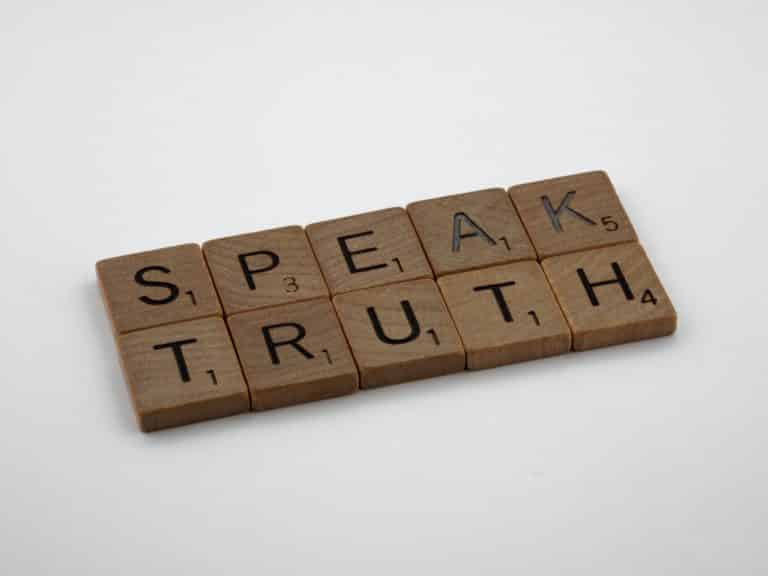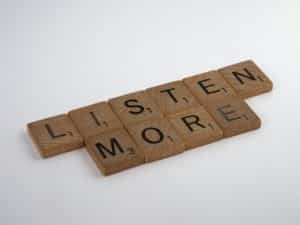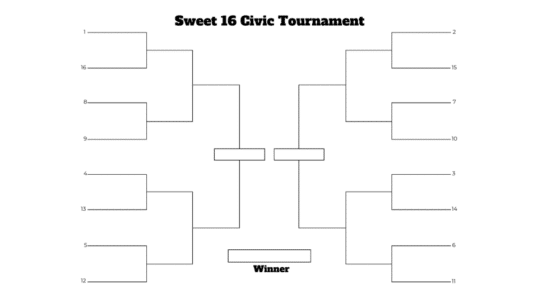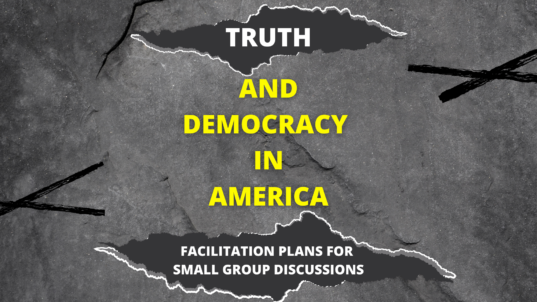
Photo by Brett Jordan on Unsplash
In this first session of our small-group conversation series on Technology & Democracy, citizens from around the country (and the world) gathered online via Zoom for an exploratory discussion of several central questions on the interplay of truth with technology and our democracy. These questions included—
- How do we get access to good information that is needed for democracy to function?
- What is the role of truth in a democracy?
- And what concerns surround the role that technology can or should play in relation to democracy and truth (or information)?
- How might we address some of these concerns at a societal level?
In the Discussion Summary below we’ve summarized many of the different ideas as well as some of the common themes that emerged from each small-group’s discussion of these and other questions concerning Technology & Democracy…and truth.
Our 2nd discussion in this 3-part series will be held this Thursday, July 1st, at 7:30 pm (ET) and will focus on questions, concerns, issues, and ideas concerning privacy and technology and democracy. You can register for it directly on our website. Please note that registration is separate for each of the three discussions in this series.
Discussion Summary
How do you get the information you need as a citizen in a democracy?
- Multiple sources, principally through online channels and social media including Twitter, Facebook, Instagram, Linkedin, etc. I look for posts that link to an underlying news article published by a newspaper, magazine, or television news.
- Significant changes over time: fewer and fewer get their news from—
- printed and delivered newspapers or magazines; or
- From regular, broadcast television and network news divisions—the “nightly news”
- From any local news producers. Both local newspapers and local TV news divisions are dead or dying.
- But some get some local news via online platforms focused on local affairs like Nextdoor.
- Trusted family and friends share news items and recommend articles to read—often or usually online. From my community: neighbors, church members,
- Internet is a key source—directly from online news sites for
- major television networks (CNN, NBC, PBS, Fox News, CBS, ABC, etc.)
- national newspapers (New York Times, Wall Street Journal, Washington Post),
- news or current affairs magazines (The Economist, The Atlantic, Time, US News & World Report, etc.)
- news agencies: Associated Press, Reuters, etc.
- newer, online-only news producers and commentators (bloggers, commentators)
- Indirectly online via subscribing to or following a news producer or commentator on Twitter or Facebook or another social media channel
- News sites from different countries: the BBC, German news channels, Al Jazeera.
- Congressional website; other government websites and sources.
- From multiple sources to both get a bigger, aggregate picture and to get different and independent views as well.
- I follow trending topics online.
What challenges have you faced in getting the information you need? And other questions/concerns about the role of truth (or trusted information) in a democracy.
- Political and ideological polarization and information silos and echo chambers. We are not getting fully accurate, objective information and the complete picture. We all have to—
- be aware of bias or slant in different news sources; false or slanted reporting
- be aware of our own cognitive biases and logical fallacies and how we’re consciously or unconsciously selecting only certain sources and stories and excluding others and seeking news that “confirms” or reinforces our pre-existing views, our identity, and makes us feel smart while we’re really often misinformed
- seek out more than one source or perspective
- develop and use critical reasoning skills and read between the lines
- “do your own research” to get a more accurate view.
- Parents/family
- were ideologically split, so I try to read sources from different political viewpoints
- didn’t discuss politics or public affairs, so I didn’t learn much about public affairs or the habits to follow them.
- What is or should be the news? Or what really matters in information?
- That it be local because local affects us more directly?
- So much “news” is really entertainment (opinions, gossip, sensational but non-substantive news) parading as “real news”
- Cost—paywalls; quality information and news only for the rich?
- Advertising – can’t stand the commercials and the clickbait; tend to avoid news for this.
- Algorithms that show us news either for commerce (to sell us something) and/or that sort the news for me in ways that don’t help me to become truly and truthfully informed.
- Time—never enough time to read and reflect on the news; not reading in depth.
- Quantity—there’s too much news available, being sent to my devices; it’s like a fire hose. I can’t keep up and/or filter it.
- Generational and technological challenges—how to access and best use online sources.
- Commercial motives that distort or control news coverage, that just seek to keep us watching or clicking, to sell us something, or distract us from the truth.
What role does truth (or good/trusted information, etc.) play in a democracy. How important is it or why does it matter?
- Key to democracy is choice; and for a choice to be real, it must be informed. And for informed decision-making, you need facts, good information, truth. We need the truth to make good, effective decisions.
- If the information is false, the decision will be false because you don’t really know what you are deciding.
- Purposeful decision-making is behind every policy decision and is fundamental to democracy.
- Truth and trust in it are essential to democracy.
- Or not. Perhaps the truth is unknowable, why bother?
- Whose “truth” are we talking about?
- Perhaps everyone’s interpretation of the facts is equally valid.
- Perhaps veracity does not matter, as long as we can be entertained or mollified.
- The challenges of knowing the truth in an era of rising sectarianism.
- Truth–or reliable and shared information–and trust in it helps build and sustain society and civilization—both literally (bridges and other infrastructure) and metaphorically and institutionally—schools, science, engineering, medicine, defense, public health, efficient markets and trade policy, foreign policy, and peace.
- Without the truth or good/better shared information—
- Wars, pandemics, climate change, violence
- Prejudice, misunderstandings, injustice
- People die.
Different questions and concerns about the role of technology in strengthening or weakening the role of truth and/or our democracy itself. Our technology is…
- Now automatically filtering the facts, the news that we see.
- Contributing to information bubbles or silos that we live in and giving us the information that we want to see and reinforcing our confirmation biases.
- Making it harder for us to distinguish between news and opinion, fact and fiction.
- Allowing us to be our own editors and do our own research—not always for the better.
- Vastly accelerating the spread of misinformation and disinformation.
- Providing too much raw or inflammatory information (the fire hose problem) and too little context.
- No substitute for the hard and necessary work of critical reasoning, education, interpretation, context, wisdom, testing, patience and prudential judgment. Unless we let it be…
- Neutral; the effects it has depend on the motives or intentions behind it.
- Unaccountable; or it makes it easier for the human actors behind the technology to escape accountability for their views or biases.
- Uncaring as to whether its users or the population in general are sufficiently trained or otherwise capable of the necessary sifting, sorting, editing and critical reasoning to distinguish good, reliable information from misinformation and disinformation.
- Providing a false sense of veracity: “it must be true, I read it online.”
- Providing vast profits to the corporations that own it (“Senator, we sell ads…”), and consciously and constantly re-writing the algorithms and the truth if doing so increases their profits.
- Providing a new online forum or public square in which we need to promote and protect everyone’s right to free speech, especially political speech.
- We should not ban people from social media or the new public square or otherwise regulate their speech on it.
- People should be able to say whatever they want; or say whatever they want as an opinion.
- People need to be able to argue about things from different points of view.
- Raising questions as to whether—
- there should there be any limits (e.g. “fire in a crowded theatre” or “fighting words”) or accountability to others for publishing lies or misinformation (libel)?
- People shouldn’t be able to say just anything without consequences. There are Constitutional and reasonable limits on the right of free speech.
- But neither the government nor media organizations should control the opinions we hear or exclusively control the media, the apps, or other communications systems.
- the government should be able to use social media (or other applications or wiretaps on telephones) to monitor what citizens say? And under what conditions or safeguards?
- there should there be any limits (e.g. “fire in a crowded theatre” or “fighting words”) or accountability to others for publishing lies or misinformation (libel)?
Finally, what might we do–what possibilities can we imagine–to respond to some of these concerns?
- Build an online “truth model”: build trusted, quality databases and algorithms that can house and deliver the “truth.”
- We might also consider instituting a “truth scoring” system similar to credit scores or reputation tracking apps or other current means of evaluating online users (e.g. product reviewers).
- Might motivate people to improve their “truth score”
- Could work like credit scores (run by private companies)
- We should be critical of using a “truth score” to evaluate posts and of proposals to ban people from social media
- Who decides what is good or bad information and where to draw the line?
- Who will construct and administer this scoring system? And would a “truth score” follow you throughout your whole life?
- Algorithms can incorporate the biases of their creators.
- We don’t want private companies controlling our truth scores.
- How could an automated algorithm account for opinions versus facts, or sarcasm, humor/jokes.
- We shouldn’t police it. We should give people the freedom to say what they want and companies the freedom to structure their platforms the way they want.
- Would banning people from social media weaken democracy?
- Some other specific policy ideas:
- Re-institute the “fairness doctrine” and require news broadcasters and other platforms to report unbiased news and/or provide opposing viewpoints.
- Pay for it. That is, pay for quality news; don’t rely solely on advertising or algorithms to sell ads.
- Let the market sort it out: promote competition among different media platforms so users can migrate to better ones.
- Use time-limited bans (e.g. 30 days) so people can correct their behavior.
- Get rid of anonymous profiles to make people accountable.
- Require transparency about the algorithms that determine what we see.
- Require a media literacy course as a prerequisite for opening a social media account.
- Alternatively, we could focus on people rather than technology and on educating citizens and ourselves.
- We should educate ourselves about various public issues and their histories so we can better evaluate the news and all the information we receive, consume, or create.
- We need to teach and practice critical thinking and media literacy skills–both in school and to all citizens.
- We also have to be personally ready and prepared to hear the truth.
- We have to be aware of our own cognitive biases. We have to be honest with others and with ourselves.
- We have to be critical thinkers.
- We have to listen more, actively, and well.

Photo by Brett Jordan on Unsplash
- Start should focus on interactive communication and locally, at the grassroots.
- Good conversation is essential and can help deepen our understanding and widen our perspectives.
- We need to dialogue with people different from ourselves.
- Get people to connect or reconnect and dialogue and share information directly about the news and especially local affairs.
- Bring people together in real time and face to face (or online) to engage with each other to hear, explore, and develop contrasting views, ideas, and possibilities.



